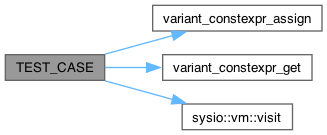Loading...
Searching...
No Matches
Include dependency graph for variant_tests.cpp:

Go to the source code of this file.
Classes | |
| struct | minimal_vis |
Functions | |
| TEST_CASE ("Testing variant with stateless class", "[variant_stateless_tests]") | |
| TEST_CASE ("Testing argument forwarding for visit", "[variant_forward_tests]") | |
| template<typename V , typename T > | |
| constexpr bool | variant_constexpr_assign (T &&t) |
| template<typename V , typename T > | |
| constexpr bool | variant_constexpr_get (T &&t) |
| TEST_CASE ("Testing constexpr variant", "[variant_constexpr_tests]") | |
| void | check_requirements () |
Function Documentation
◆ check_requirements()
| void check_requirements | ( | ) |
Definition at line 231 of file variant_tests.cpp.
231 {
233 variant_type v((double)42);
237}
stores null, int64, uint64, double, bool, string, std::vector<variant>, and variant_object's.
Definition variant.hpp:191
Definition variant_tests.cpp:219
Here is the call graph for this function:

◆ TEST_CASE() [1/3]
| TEST_CASE | ( | "Testing argument forwarding for visit" | , |
| "" | [variant_forward_tests] ) |
Definition at line 47 of file variant_tests.cpp.
47 {
48
50
51 // visitor forwarding
52
53 // lvalue
54 {
55 struct vis {
58 void operator()(...) {}
59 };
60 variant_type v((double)42);
61 vis f;
64 }
65 // rvalue
66 {
67 struct vis {
70 void operator()(...) {}
71 };
72 variant_type v((double)42);
73 vis f;
76 }
77 // const lvalue
78 {
79 struct vis {
82 void operator()(...) {}
83 };
84 variant_type v((double)42);
88 }
89
90 // variant forwarding
91
92 // lvalue
93 {
94 struct vis {
95 void operator()(double& v) { v = v + 1; }
96 void operator()(...) {}
97 };
98 variant_type v((double)42);
99 visit(vis{}, v);
101 }
102
103 // rvalue
104 {
105 struct vis {
106 void operator()(double&& v) {
107 v = v + 1;
108 }
109 void operator()(...) {}
110 };
111 variant_type v((double)42);
112 visit(vis{}, std::move(v));
114 }
115
116 // const lvalue
117 {
118 struct vis {
119 void operator()(const double& v) {
120 const_cast<double&>(v) = v + 1;
121 }
122 void operator()(...) {}
123 };
124 // Don't declare this const, because that would make casting away const illegal.
125 variant_type v((double)42);
128 }
129}
Here is the call graph for this function:

◆ TEST_CASE() [2/3]
| TEST_CASE | ( | "Testing constexpr variant" | , |
| "" | [variant_constexpr_tests] ) |
Definition at line 170 of file variant_tests.cpp.
170 {
172
173 {
174 constexpr variant_type v{(signed char)2};
175 constexpr signed char result_lv{v.get<signed char>()};
176 CHECK(result_lv == 2);
177 constexpr signed char result_rv{variant_type{(signed char)4}.get<signed char>()};
178 CHECK(result_rv == 4);
179 }
180 {
181 constexpr variant_type v{(double)2};
182 constexpr double result_lv{v.get<double>()};
183 CHECK(result_lv == 2);
184 constexpr double result_rv{variant_type{(double)4}.get<double>()};
185 CHECK(result_rv == 4);
186 }
188 CHECK(assign0);
190 CHECK(assign1);
191
193 CHECK(get0);
195 CHECK(get1);
196
197#ifdef CONSTEXPR_STD_INVOKE
198 {
199 struct vis {
200 constexpr int operator()(signed char v) { return v + 1; }
201 constexpr int operator()(short v) { return v + 2; }
202 constexpr int operator()(int v) { return v + 3; }
203 constexpr int operator()(long v) { return v + 4; }
204 constexpr int operator()(float v) { return v + 5.0f; }
205 constexpr int operator()(double v) { return v + 6.0; }
206 };
207
209
210 {
212 CHECK(test == 3);
213 }
214 }
215#endif
216}
constexpr bool variant_constexpr_assign(T &&t)
Definition variant_tests.cpp:132
Here is the call graph for this function:

◆ TEST_CASE() [3/3]
| TEST_CASE | ( | "Testing variant with stateless class" | , |
| "" | [variant_stateless_tests] ) |
Definition at line 8 of file variant_tests.cpp.
8 {
9 struct vis {
10 int operator()(signed char v) { return v + 1; }
11 int operator()(short v) { return v + 2; }
12 int operator()(int v) { return v + 3; }
13 int operator()(long v) { return v + 4; }
14 int operator()(float v) { return v + 5.0f; }
15 int operator()(double v) { return v + 6.0; }
16 };
17
19
20 {
21 variant_type v((signed char)42);
23 }
24 {
25 variant_type v((short)142);
27 }
28 {
29 variant_type v((int)242);
31 }
32 {
33 variant_type v((long)342);
35 }
36 {
37 variant_type v((float)442);
39 }
40 {
41 variant_type v((double)542);
43 }
44}
Here is the call graph for this function:

◆ variant_constexpr_assign()
Definition at line 132 of file variant_tests.cpp.
132 {
133 V v{t};
134 T expected{t};
135 bool result = true;
137 result = result && (v.template get<T>() == expected);
138 v = t;
139 result = result && (v.template get<T>() == expected);
141 result = result && (v.template get<T>() == expected);
142
143 // copy and move assignment
145 result = result && (v.template get<T>() == expected);
147 result = result && (v.template get<T>() == expected);
149 result = result && (v.template get<T>() == expected);
150 return result;
151}
#define T(meth, val, expected)
Definition test_zm.cpp:19
Here is the caller graph for this function:

◆ variant_constexpr_get()
Definition at line 154 of file variant_tests.cpp.
154 {
155 V v{t};
156 T expected{t};
157 bool result = true;
159 static_assert(std::is_same_v<decltype(static_cast<V&&>(v).template get<T>()), T&&>, "check get result type");
160 static_assert(std::is_same_v<decltype(static_cast<const V&>(v).template get<T>()), const T&>, "check get result type");
161 static_assert(std::is_same_v<decltype(static_cast<const V&&>(v).template get<T>()), const T&&>, "check get result type");
162
163 result = result && (v.template get<T>() == expected);
167 return result;
168}
Here is the caller graph for this function:
